学年论文实训
《关于我国电子商务的论文综述》
关于我国电子商务的论文综述
课题简介:
我国的电子商务项目有广大的市场,为了认清我国电子商务的现状和发展前景,特意查了相关资料写一篇论文综述。
摘要:随着网络技术的发展,电子货币作为基于网络的支付结算工具正以前所未有的速度发展。文章从电子货币概念出发,不仅分析了它的发展情况,而且针对电子商务的业务流程,对其在电子商务中的应用进行了重点研究。最后提出了应用过程中出现的问题及解决方案。
关键词:电子商务 现状 前景
前言:
随着信息技术的应用,网络经济发展迅速,2010年工业和信息化部发布的数据显示,我国网民总数达到4.04亿人。相比前几年,网民数量呈“雪崩式”增长。但是经常在网上购物的人数增长仍然缓慢,2010年我国网民网络购物市场规模达到4980亿,购物人数规模达到1.85亿。研究发现多数网民仍然是“橱窗式购物者”,在线收集商品信息,而离线购买商品。虽然互联网突飞猛进的发展是建立在技术基础上的,然而其意义远不止于技术特点,更在于它使网上消费者在面对几乎无穷多的选择时产生新的心理和行为模式。在网络环境下,消费者的消费观念、消费偏好和最终消费行为发生了明显变化。
正文:
一、我国电子商务的现状
目前网上消费者购买行为的研究主要集中于影响购买行为的因素以及模型上。对预测购买行为的变量类型大体可分为网上消费者的特征、感知、技术特性和社会背景四类。
1.网上消费者特征变量的研究。研究发现我国的网上消费者文化程度较高,大专以上占84%;以年轻人为主,集中在18-24岁;学生为消费主体,达到21%,其次为计算机从业人员和三资企业员工。国外研究学者把生活方式、个人创新、可支配时间、产品信息的搜索、网络技术的自我效能感、电子邮件的使用和之前网站的使用等也作为购买行为的预测因素。
2.网上消费者感知变量的研究。研究发现消费者感知变量和感知风险能预测购买行为。消费者感知网上购物有用、网上购物方便、安全是影响消费者网上购物态度和意向的三个关键决定因素。学者把网上消费者面临的主要风险归纳为8类:隐私风险、财务风险、功能风险、时间风险、支付风险、交付风险、来源风险和心理风险。决策过程中,当总感知风险超出消费者个体所能承受的风险范围,消费者就会推迟或放弃消费行为。
3.技术特性变量的研究。技术特性是网站的实际功能和特征。与基于网站的商品目录相比,纸制目录可以产生更高程度的顾客参与度。另有学者发现在目录界面设计、多通道界面设计和基于虚拟现实商店的界面设计之间在花费的钱数或购买产品的数量上没有显著差异。另外,购物比较、保证机制、网页下载速度、附加价值搜索机制、购物车、反馈机制和聊天渠道等技术特性对购买行为具有显著影响。
4. 社会情境变量的研究。社会情境包括外部影响因素(大众媒体和广告等)和人际影响因素 (口碑、朋友、亲戚和与社会网络有关的其他来源)。许多研究结果都支持了社会情境变量对网络使用和网上购物意图的显著影响。
二、理论依据及分析模型
在过去的几年中,学者已经研究了各种情境下的网上消费者行为。营销学中的理论依据多来自于其他学科,社会学、心理学、经济学。心理学中的计划行为理论、理性行为理论、技术接受模型理论就是学者预测网上消费者行为时主要的理论模型。
理性行为理论研究的是有意识行为打算的决定性因素,实质上可用于解释任何一种人类行为,对于不同领域的行为,它都能做出很好的预测和解释,是研究人类行为最基础的最有影响力的理论之一。根据理性行为理论,一个人执行某项行为是由他的行为意向决定的,行为意向是由个人对所要执行的行为的态度和主观规范共同决定的。
计划行为理论是由理性行为理论延伸而来的,计划行为理论与理性行为理论不同之处就在于对行为意向的预测上。计划行为理论增加了第三个决定性因素—— 感知的行为控制。感知的行为控制是指个人感知到完成某一行为容易或困难的程度,它反映个人对某一行为过去的经验和预期的阻碍。
技术接受模型是运用理性行为理论研究用户对信息系统接受时所提出的一个模型。技术接受模型提出了两个主要的决定因素:① 感知的有用性,反映一个人认为使用一个具体的系统对他工作业绩提高的程度。② 感知的易用性,反映一个人认为容易使用一个具体的系统的程度。技术接受模型认为系统使用是由行为意向决定的,行为意向是由某人想用的态度和感知的有用性共同决定的。
研究者独立或相互结合地使用这些模型或理论,考察它们的预测能力。
三、我国电子商务的前景
在回顾文献的过程中可以发现多数研究集中探讨网上消费者特征、感知、技术特性和社会情境等单类变量对购买行为的影响。学者把预测购买行为的变量分成四类,方便了研究的进行,是研究更有条理性,但是在一定程度上也限制了研究的进行,对不同类别预测变量对购买行为影响的研究和同一类别不同变量之间关系的研究并不多。
另外学者往往将商家的客观变量与消费者的感知变量割裂开来考虑对购买行为的影响,而将二者结合起来考虑对购买行为影响的研究不多。一个消费行为中,商家和消费者是不可或缺的两个部分,二者之间相互影响,消费者在做出购买决策的过程不但是自身感知变量影响的结果,同时也是商家客观变量影响的结果,因而二者共同对消费购买行为的预测研究具有很重大的意义。
同时,文献回顾中发现多数实证研究对象来自国外,国内学者对网上消费者购买行为的研究多属于理论范围的探讨,实证研究过少。这给国内学者继续研究网上消费者行为提供了很好的方向。
结论:
电子商务目前发展遇到的问题不仅仅局限于上面谈到的,电子商务的发展还会带来什么样的问题谁也无法预料,而我们要解决和完善这些问题并不是由某个人或某个团体所能及的,因此想要腾飞,我们应该不畏惧艰险,迎难而上,使中国电子商务更好的发展和完善。
参考文献:
[1]夏露. 积极应对外贸电子商务的挑战[J]. 湖北工学院报,2002,(3).
[2]王树彤. 外贸电子商务可为出口型企业杀出一条血路[J]. IT时代周刊,2011
[3]牟健卫. 康帕斯企业发展战略研究[D]. 北京交通大学: 北京交通大学,2011.
[4]中国三星研究院战略组研究员 林瑞明. 外贸电子商务:多赢商业概念缘何迟迟未火?[N]. 第一财经日报,2011-07-05
[5]本报记者 李娟. 外贸电子商务:低调潜行中疯狂成长[N]. 中国经营报,2010-12-06
[6]商报记者 张绪旺. 四海商舟引领精准化外贸电子商务[N]. 北京商报,2011-07-06
第二篇:电子商务网上购物毕业论文中英文资料对照外文翻译文献综述
中英文资料对照外文翻译文献综述
附件1:外文资料翻译译文
网上购物的自由、控制和乐趣
网上购物的消费者数量和网上购物的数额正在上升;费雷斯特研究公司估计,今年互联网销售额是去年的20亿倍以上。相比之下,美国去年的整体零售销售额达13万亿美元。因此,目前电子商务的销售额仅占零售销售额的1%左右。专家和学者闷得争执消费者网上消费的百分比的可能上限。网上消费上限将超过其他直接营销的15%,或者如费雷斯特研究公司所建议的,到20xx年占许多零售采购产品类别的1/3.最终,在何种程度上满足购物目标导向和有经验的消费者需求将影响消费者会选择花在每个环境中的美元金额。虽然许多作家都在鼓吹在线媒体提供交互性和个性化的体验的独特功能,例如,很少有系统的集中于网上购物者真正需要什么,以及为什么他们把网上购物放在第一位清楚的了解什么激发消费者网上购物可以并应告知战略、技术和市场营销的决定,以及网站设计。那么,什么激发网上购物?在离线的环境中营销人员认识到,消费者不同的消费方式取决于他们用于搜索的动机是否主要是体验(因为好玩)还是目标导向(因为效率高)。我们的网上客户的研究表明,这两种动机同样可以推广到在线环境。
体验行为特别可能发生在消费者有一个持续的爱好型的兴趣类别中。收藏家和爱好者享受“惊险的狩猎”一样收藏各种收藏品。同样,有时间保证和欲望刺激可以引起更多的体验购物行为。学者们还发现,更高的娱乐性与体验行为比专注于目标的购物引起更积极的情绪、更大的网上购物满意度和更高可能性的购物冲动行为。
目标导向或功利购物已被各种营销学者描述为任务导向的,高效的,合理的和蓄意的。因此,专注于目标的购物是以交易为导向,希望快速购买他们想要的东西而无需焦急。零售消费者将功力购买描述为“工作”和评估其努力的成功的条款通常与工作表现相关词汇联系起来,如“成功”“完成”。重要的是,市场调查公司发现,2/3到4/5的互联网买家从事特定产品的狭义在线搜索。在我们最近的一项与1013哈里斯互动在线事务委员会成员进行的网上调查中,71%的购物者说。他们最近大部分网上购买的是他们先前已经计划过的,而29%说当他们提出购买时他们已经浏览过。因此,网上购物更可能专注于目标而非体验。主要的电子商务网站的点击流分析表明,在线消费者趋向于专注目标。
例如,持续时间在商店或在王章上停留,被电子商务业内人士成为“粘性”,是因为体验购物者有比以交易为导向的消费者“粘”于周围更长时间的相关强烈动机。目前,每周定期有Nielsen-NetRatings 公司提懂得数据显示,电子商务网站的“粘性”是相当有限的,当顶级网站的访问长度(重要的电子湾例外)大部分为15分钟或更少时间。一每周平均花费在Barnes和Noble的时间为典型例子,比如说10分钟,只是大约找一本书和实际完成交易那么长的时间。
为什么更多的电子零售消费者期望专注于目标?一个线索发现,时间缺乏的消费者特别可能成为网上购物者。另一个线索是早气的重量级互联网用户有强烈的每部控制倾向,并因此是目标导向的人士。此外,在线媒体随着产品信息搜索成本的显著减少而促进功利行为。我们的在线购物者的研究表明,目标导向的购物者对电子零售感兴趣是因为其4个特殊的属性:(1)便利无障碍(2)可挑剔(3)信息的实用(4)无社交。重要的是,消费者往往并明确的将这些以目标为导向的属性于更多兹有和控制联系起来。
不管网上功利购物的优势,有证据表明,一些从事体验购物或为了兴趣而购买的购买者。作为乐趣探求者而倾向于冲动地进行更多的购物对市场来说是合理的行为。为什么一些网上购物者参与体验行为呢?体验购买者告诉我们他们喜欢:(1)拍卖;(2)作为爱好的参与;(3)逢低买进;总之,这些购物者着眼于“经验”,或者网上购物能和得到产品采购时获得的一样多的乐趣。表一。
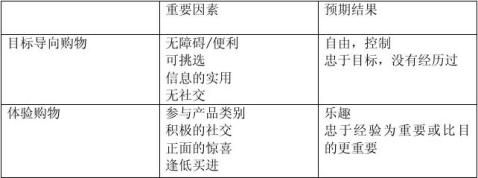
研究方法
这项研究得到了资讯科技中心组织(CRITO)在美国加州大学欧文分校的支持。该项目是我目的是了解有助于消费者拥有一个满意的、高质量在线购物体验的属性。我们在开展这项研究的具体目的是要充分了解网上购物的消费动机,姻为这些动机将影响到网站的属性和所需的购物者的经验。鉴于我们队消费者认知的兴趣和目前解决这问题的定性数据的缺乏,我们将网上买家分成9个焦点小组(总共64位消费者)。三个焦点小组包括MBA学生、职员和可能是技术“快速转发”从而成为早期网上购物的接收者的一组。此外,我们组织了两个从哈里斯互动网上招募的南加州离线焦点小组。最后,我们与哈里斯互动公司组织了四个下线焦点小组(包括在美国和加拿大的参与者)。哈里斯互动公
司招募在线和离线参与者,目的是创造一个设计年龄、性别、在线经验和在线购买产品的不同小组。我们的样本包括19-81岁的参加者;他们购买CD、书籍、软件、硬件、玩具、和旅游、从事网上拍卖,消费所有常见在线购买类别。但是,除了这些主要类别外,还有各种各样的交易,包括弹药、内衣、杂货、野营设备、汽车,甚至一个参与者在网上购买了他的房子!
网上订性研究提供了获得个人以及群体反应的概念和研究问题的优势,同时减少在群体中的个体控制团体或用它们的人格力量说服其他受访者的机会。网上焦点小组方法唤起诚实的、直接的和稍微更少的被传统焦点小组呈现的社会惯例的抑制的对话。网上定性研究是唯一适合迷人的互联网悟性受访者。者是很大的吸引力,对他们来说,时间非常宝贵。同时。网上焦点小组达到通常情况下不达成的传统面对面焦点小组,包括在边远地区和回国的受访者。此外,在地里上位于不同地区的个人可以参加同一个会话。受访者使用自己的电脑,并且不必跑到一个焦点小组设施。
基于现存的有关在离线购物中心的目标导向与体验动机和关于猜测应用于在线环境的这些动机的文献,我们询问参与者他们购买时为了娱乐还是特殊的需求。同时,我们调查网上买家对照在线浏览执行相对较窄的产品搜索的程度。我们还要求焦点小组参与者比较在线和离线购物,增加我们对在网上购物的基本决定因素的理解,更具体的说,对于部分焦点小组集中的动机,我们的指南包含下列问题:
我想首先讨论购物。几乎每个人都喜欢购物,或不得不购物。
描述你典型的在线购物体验。
你通常在那里购物?在一天中的什么时间?多频繁?
一般来说,当思考在线购物和离线(砖和石灰)购物时会记住什么区别?
离线----什么经验令人愉快?什么令人头疼?
在线----什么经验令人愉快?什么令人头疼?
什么因素影响你选择在商店里购物还是在线购物?
有什么东西你用一种模式购买而不用梁一中模式购买的?
当焦点小组的提问有一个协议时,每个焦点小组包括作为参与者的解释和答案的唯一范围将提示后续行动到不同领域:离线协议或多或少有点时候在线焦点小组。在4个在线焦点小组中,当研究人员们都在“阴暗处”,即未呈现在参与者面前时,一个专业的主持人跑向这几个小组;研究人员们可以与这个主持人幕后沟通,提出问题或者探讨。这些在线小组以“聊天室”的格式实时举行。作为在线小组的一部分,所选的网站在参与者能够回复和交互的电脑上产生。
当在线小组录音自动生成时离线焦点小组被转录。我们分析了有系统地进行分析和标签网上购物的属性的笔录。我们同时进行了编码和理论的发展,并最终发展四类目标导向的动机和三类体验的动机。表2显示了目标导向和体验的动机特征和属性是如何对比和编码的。同时,我们寻找目标导向和经验的动机的关系或理论联系,这一过程称为
“迭代处理”。
不用具体的统计小组表并符合焦点小组分析数据的管理实践的报告,我们建议达成不需要特定的大小或数量级程度的共识,特别当这样的信息对管理者有用时。但是大公司报告的定量的市场研究数据配合我们的研究结果用来支持我们的主张。不过,优势的反应并不完全指导我们的分析。特殊的反应不仅提供有关该范围内的相关调查结果的线索,还为其他研究参与者未阐述的问题做铺垫。
表2.焦点小组参与者对网上购物的描述
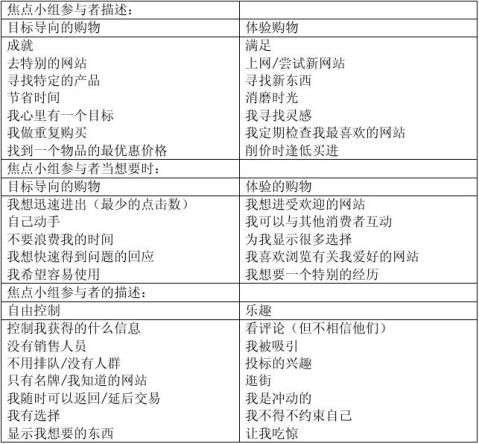
目标导向的购物
特别令人印象深刻的是,目标导向的购物者提到的在线购物时体会到更多的自由和控制的频率。因此,网上客户不是被动的市场营销接收者,而是在在线环境中体验更多控制的主要参与者。有趣的是,在线购买者常说他们觉得在线购物只在他们心中有特定采购订单时,即大多数描述网上购买为主要的计划购买的组成。实际上,很多网上买家告诉我们他们并不一定认为网上购买是“购物”。相反,他们认为是“购买”。我们特地向网上买家他们在线或离线购物哪个更冲动,从中了解到绝大多数消费者离线购物会更冲动(除了在拍卖网站更可能是体验的购物行为的地方)。网上购物一般没有冲动是由于
无法理解占有商品,返回后缓解一下,更一步考虑才买下商品,且有邮回的并不是想要的商品的烦恼。
附件2:外文原文(复印件)
SHOPPING ONLINE FOR FREEDOM,CONTROL AND FUN
The number of consumer buying online, and the amount being spent by online buyers has been on the rise; Forrester Research has estimated internet sales in 1999 to be more than double that of 1998,$20 billion .In comparison,overall retail sales in the U.S. totaled $13 trillion in 1999. thus,e-commerce sale currently account for only about 1% of retail sales, and experts and scholars have argued over the possible upper limit to the percentage of consumer online spending. Will the upper limit of online spending exceed that of other direct marketing at 15%? Or will it be as much as one third of purchases in many retail product categories by 2010 as recently suggested by Forester Research?
Ultimately, the degree to which online shopping fulfills goal-oriented and experiential consumer needs will impact the amount of shopping dollars that consumers will choose to spending each environment. While many writers are touting the unique capabilities of the online medium to provide interactivity and personalized experiences, for instance, few have focused systematically on what online shoppers really desire, and why they are shopping online in the first place. Clearly understanding what online shoppers really desire, and why they are shopping online can and should inform strategy. Technology and marketing decisions as well as website design. So ,what motivates online shopping? In the offline environment, marketers recognize that consumers shop differently depending on whether their motivations for searching are primarily experiential (for fun) or goal directed (for efficiency). Our research of online customers suggests that these two motivations generalize to the online environment as well.
Experiential behavior is especially likely in categories where shoppers have an ongoing, hobby-type interest. Collectors and hobbyists enjoy the “thrill of the hunt” as much as the acquisition of items for the collection. As well, having time available and desiring stimulation results in more experiential shopping behavior. Scholars have also discovered that the higher playfulness associated with experiential behavior results in a more positive mood, greater shopping satisfaction and a higer likelihood of impulse purchasing compared to goal-focused shopping.
Goal-oriented or utilitarian shopping has been described by various marketing scholars as task-oriented, efficient, rational, and deliberate. Thus, goal-focused shoppers are transaction-oriented and desire to purchase what they want quickly and without distraction. Retailing consumers describe utilitarian shopping as "work" and evaluate the results of their effort by terms commonly associated with work performance, such as "success" and "accomplishment."
Importantly, marketing research firms have found that two-thirds to four-fifths of Internet buyers engage in narrowly defined searches for specific products online.* In an online survey we recently conducted with 1013 members of the Harris Interactive online panel, 71% of shoppers said their most recent online purchase had been previously planned, while 29% said they had been browsing.
when they made their purchase. Thus, online shopping is more likely to be goal focused rather than experiential. Click stream analysis of major e-commerce sites also suggests that online consumers tend to be goal-focused. For example, duration time spent in a store or at a site, termed "stickiness" by e-commerce insiders, is strongly correlated with motivation, as experiential shoppers "stick"around longer than do transaction-oriented consumers. Currently, weekly data provided by Nielsen-Net Ratings regularly show that the "stickiness" of e-commerce web sites is quite limited, with the length of visits at top sites (with the significant exception of e-Bay) being largely 15 minutes or less. A typical weekly average time spent on Barnes and Noble, for instance, is 10 minutes, just about long enough to find a book and actually complete the transaction.
Why are more e-tailing consumers expected to be goal-focused? One clue is the finding that time-starved consumers are especially likely to be online shoppers. Another clue is that early and heavy users of the Internet tend to have a strong internal locus of control and thus are goal-oriented personalities. Moreover, the online medium facilitates utilitarian behavior as search costs for product information are dramatically reduced.'" Our research with online shoppers suggests that goal-oriented shoppers are interested in e-tailing because of four specific attributes: convenience and accessibility; selection; availability of information; and lack of sociality. Importantly, shoppers frequently and explicitly associate these goal-oriented attributes with increased freedom and control.
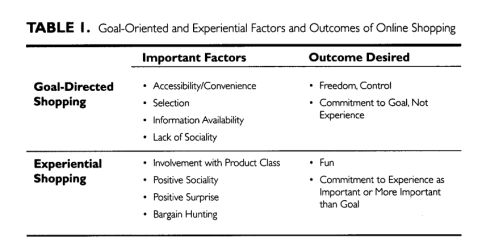
Despite the preponderance of utilitarian online shopping, there is evidence that some online shoppers engage in experiential shopping, or shopping for fun, a behavior desirable to marketers as fun-seekers tend to be impulsive and to make more purchases." Why are some online shoppers engaging in experiential behavior? Experiential shoppers tell us they enjoy: auctions;involvement with a hobby/product class; and bargain hunting. In sum, these shoppers focus on "the experience" or fun of online shopping as much as they do on product acquisition (see Table 1).
Research Methodology
This research was supported by the Center for Research on Information Technology in Organizations (CRITO) at the University of California, Irvine. The purpose of the project is to understand the attributes that contribute to consumers having a satisfying, high-quality online shopping experience. Our specific purpose in undertaking this research was to fully understand consumer motivations for online shopping, as these motivations will affect the web site attributes and experiences desired by shoppers. We undertook 9 focus groups of online buyers (64 consumers altogether). Three focus groups included MBA students and staff, a group likely to be technology "Fast Forwards"'^ and thus early adopters of online shopping. In addition, we conducted two offline focus groups in Southern California recruited from Harris Interactive's online panel. Finally, we worked with Harris Interactive to conduct four online focus groups (including participants from across the U.S. and Canada). Harris Interactive recruited both online and offline participants with the aim of creating groups who were diverse with respect to age, sex, online experience, and products purchased online. Our sample included participants aged 19 to 81; they purchased CDs, books, software, hardware, toys and travel, and engaged in online auctions, all common online buying categories. However, outside these major categories, a wide variety of purchases were made, including ammunition, lingerie, groceries, camping
equipment, cars; one participant had even purchased his house online!
Online qualitative research offers the advantage of obtaining individual as well as group reactions to concepts and research questions, while minimizing the opportunity for individuals in the group to dominate the group or persuade other respondents by the force of their personalities. The online focus group methodology evokes dialogues that are honest, direct,
and somewhat less constrained by social conventions present in traditional focus groups. Online qualitative research is uniquely suited for engaging Internet savvy respondents. It is especially appealing to those for whom time is at a premium. In addition, online focus groups reach audiences not generally reached by traditional face-to-face focus groups, including those in outlying areas and respondents who are home bound. Individuals located in geographically diverse areas can participate in the same session. Respondents use their own computers and do not have to travel to a focus group facility."
Based on existing literature on goal-focused and experiential motivations in offline shopping and speculations about these motivations applying to the online environment, our study asked participants if they shop for entertainment or for specific needs."* Also, we investigated the degree to which online buyers perform relatively narrow product searches as opposed to browsing online. We also asked focus group participants to compare online and offline shopping, which increased our understanding of the underlying determinants of online shopping. More specifically, our guide for the portion of focus group focusing on motivations contained the following questions:I want to start by talking about shopping. Just about everybody likes to shop, or has to shop.
• Describe your typical online shopping experience. (Probe:)
• Where do you usually shop from? At what time of day? How often? What types of
things do you usually shop for online?
• Do you go to a specific site to shop, or do you search for items first?
• How often do you shop for entertainment vs. shop for a specific need?
• In general, what differences come to mind when thinking about online shopping and
offline (brick-and-mortar) shopping. (LIST ON EASEL)
• Offline: What makes experience enjoyable? What are the headaches?
• Online: What makes experience enjoyable? What are the headaches?
• What are the factors that influence whether you shop in a store vs. online?
• Are there items that you buy in one mode that you wouldn't buy in the other?
While there was a protocol for the focus group questions, each focus group covered
unique ground as participants' comments and answers would prompt follow-up into different areas; the offline protocol had to be adapted somewhat for the online focus groups. In the four
online groups, a professional moderator ran the groups, while hoth researchers "lurked," being present without being visible to participants; researchers could communicate with the moderator behind-the-scenes, suggesting questions or probes. The online groups are held in real time in a "chat room" format. As part of the online group, selected web sites were "spawned" on participant computers, where they could respond to and interact with the web site.
Offline focus groups were transcribed while online group transcriptions were automatically generated. We analyzed the transcripts by systematically categorizing and labeling attributes of online shopping." We undertook coding and development of theory together'* and ultimately developed four categories of goal-oriented motivations and three categories of experiential motivations. Table 2 shows how goal-oriented and experiential motivations, characteristics, and attributes were contrasted and coded. In addition, we looked for connections or theoretical connections to goal-oriented and experiential motivations, a process called "iterative tacking."
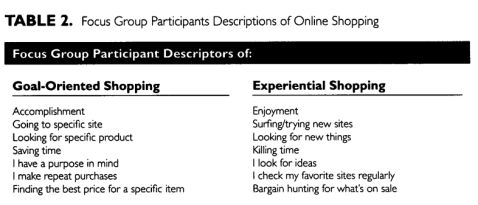

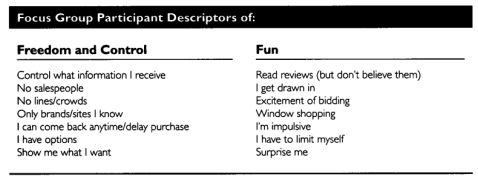
Rather than reporting specific tabulations, and in line with common managerial practice in analyzing focus group data, we have suggested a degree of consensus without necessarily claiming specific proportions or orders of magnitude, especially when such information might be useful to managers." However, quantitative market research data reported by major firms that dovetails with our findings is used to support our claims. Nevertheless, the preponderance of responses did not guide our analysis entirely. Idiosyncratic responses not only offered clues about the boundaries within which findings are relevant, but also surfaced issues not articulated as well by other study participants.
Goal-Oriented Shopping
Especially impressive is the frequency with which goal-oriented shoppers mentioned the increased freedom and control they experience while shopping online (see Table 3 for sample quotes). Thus, web customers are not passive recipients of marketing and selling and are instead central players who experience increased control in the online environment. Interestingly, online buyers often said they decided to go online to shop only when they had a specific purchase in mind, with the majority describing online buying as consisting largely of planned purchases. In fact, many online buyers told us that they did not necessarily think of buying on the net as "shopping." Rather, they think of it as "buying." We specifically asked online buyers if they are more impulsive while shopping online or offline and were overwhelmingly informed that shoppers are more impulsive offline (except at auction sites, where buying behavior is much more likely to be experiential). The general lack of impulsiveness during online shopping is due to the inahility to take possession of goods immediately, the ease of returning later to buy the goods after further thought, and the trouble of having to mail back unwanted items.
